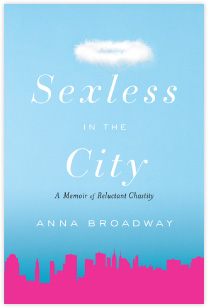Apologies for my delay today, dahlings. Now that I’m nearly a bonafide, full-time
freelancer, I seem to have slipped into that West Coast time-zone operation again. Which is appropriate, given the location of my main client. Unfortunately, though, this “home office” business hasn’t been without its headaches. :( Don’t talk to me about faxing right now ... or cell-phone signal ... or monitor backlighting ... or unrequited love (phew! That’s got us back on topic now).
Indeed,
as promised, today’s post will continue with questions concerning those
in relationships of some sort.
I read the piece on you and others in Rolling Stone and one of the fellas interviewed was asked if every sex act is off limits. Your thoughts on this?
-Amanda
Dear Amanda:First of all, it depends on why limits are imposed, and by whom. For instance, as I learned in a very informative article this morning, oral sex is still technically “off-limit” in Singapore. Even more liberal governments usually restrict sex to consensual acts between adults. Motives for such laws range between protecting the welfare of a state’s citizenry to, well, perhaps a desire to control what are perceived as otherwise dangerous passions (presumably, to the interests of the state more than the practitioners of oral sex themselves).
Religious institutions are another common source of limits, obviously, and motive can cover a similar spectrum from practitioner’s well-being to authority’s self-interest. The difference is that, at least in this country, adherence to such limits is usually voluntary and consequences for violation are at worst excommunication (I suppose governments impose fines, jail time or other sanctions). Since the article focused on Jesus freaks and our alleged chastity/virginity, let’s leave aside the Singapore case (or Muslim countries that penalize adultery), and focus on religious limits.
In the case of the Bible, it is claimed that sex was created by God for procreation of the species, unity and intimacy between partners (not to mention, shared pleasure, as sketched in Song of Solomon), and to reveal something about the character of God and the divine community on which human relationships are based. All restrictions on sexual activity are based on this threefold purpose. I can’t speak as knowledgeably on other religious sexual ethics, so I won’t discuss them here.
Notice that this purpose highly esteems sexual bonding. From a biblical perspective, Nine Inch Nails got it somewhat right with the lyric “You bring me closer to God.” Thus, the limits are related to that high view and intended to preserve the beauty, sacrality and yes, purity, of sexual relating. Think about the protections you might likewise institute regarding a piece of valuable jewelry or a nice suit when working in the kitchen (wearing an apron when cooking, taking off a ring to wash dishes) or getting it washed (not using hot water, taking it to the dry cleaner, etc.). These are likewise “limits” that you impose — on when the valued object is used, the conditions in which you place and care for it, and so on.
How fine the lineYour question is essentially, “How far is too far?” but notice that probably you don’t act the same way with that nice ring or piece of clothing. You don’t turn the water temperature up in the machine to within a degree of the shrinking point, right? And you don’t add dish soap to within a few drops of the tarnishing point. The spirit of your “law” is protection and preservation; legalism would seem rather silly.
So I would say, adhering to the biblical standards about sex is somewhat far removed from questions of penetration or not, and whether things like anal sex or oral sex are OK. That’s because the Bible as I understand it deems the relationship primary, the experience secondary. The experience serves the relationship; it is a means of building, reinforcing and intensifying it. This is one of the primary ways the Bible’s limits here are counter-cultural. Most people separate the experience entirely from the relationship in which it occurs. Thus we can have sex casually (no need for examples here) or independently (by
jacking off, using porn, etc.). If you focus on the experience itself, sure, you can break it off, divide it into segments, decree which parts can be consumed on a first date, which once engaged, and which on the honeymoon. But notice how important the orgasm becomes in this approach. Isn’t that the goal of almost all sexual experience? You have to get off, or the whole enterprise has failed. And if the woman
conceives, far more than just a condom has failed.
When the experience is
subsumed to the relationship, however, the orgasm is less forced (and therefore may be a more genuine ecstatic experience) and less essential. The experience hasn’t necessarily failed for the partners if one or both doesn’t get off every time (though it may say something about areas where they need to grow in serving each other or communicating) ... and it likewise hasn’t “failed” the couple if they do or don’t conceive a child as a result.
OK, all that probably sounds a little theoretical, right? How this has looked in my life is thus. For a long time I was really frustrated because I didn’t have a relationship. But I didn’t just want a relationship, I wanted the experiential benefits it would bring (it’s much easier to focus on the few things you don’t have than the many good things you
do). Because it’s easy to do, easy to get in our society, I chose to dabble in the experience separated from the relationship. But then one night I had a wakeup call — as somewhat accurately depicted in the interview. I realized that this dabbling was connecting me to my partners whether I liked it or not.
Ad Weasel wasn’t at all the type of guy I wanted to have a relationship with, and ironically I had gone out with him precisely because he seemed so safe in that regard — I could have fun, a little experimentation (maybe, although I didn’t really plan on that, at least consciously), and never run the risk of emotional intimacy. The trouble was, our physical intimacies were progressing rapidly toward a level that
would become emotional. An orgasm was never the goal, but precisely because it wasn’t, it was a warning sign. If we shared such a moment, I knew I would be deeply, irrevokably shaken.
For me that has meant no sexual act that results in orgasm is part of my life as a single woman. And because you can’t accurately predict when such an experience will happen, I can’t push the limits or play the game of seeing how long I can remain unburned. I didn’t always see it this way, but I have concluded that merely following the
letter of the Bible’s law involved blatant disregard for its
spirit. If that was the case, why bother at all? Since I
did want to bother, very much, I have had to revisit the core purpose of sex and seriously re-examine its implications for my relationships with men.
- Am I prepared to give myself wholly to a man? If not, then why tease as if I will?
- Am I prepared for a relationship with him that becomes creative, leading to shared community and possibly even children?
- Am I thinking about how this relationship demonstrates the character of God, or is God a being/entity/concept I’d like to forget for the next hour or so?
It’s a harsh stance, I acknowledge, but a more honest one in the end. Notice I haven’t laid out a
10-point spectrum like some writers do; in that sense there’s much more freedom. Ironically, submitting your conscience to the spirit of a principle can be a much sterner taskmaster than a “no hand-holding” law might be. That might be what Jesus was getting at in his statement on lust and adultery. After all, the Bible is most concerned with the heart motivations behind even our most-pious actions.
Whatever authority you submit yourself to, whoever you are serving (as Dylan sang about), it’s going to be an all-or-nothing proposition. You can’t “sort of” work for someone, sleep with her or him, halfway board a plane or jump out of a burning building. You do it or you don’t.
Labels: advice







